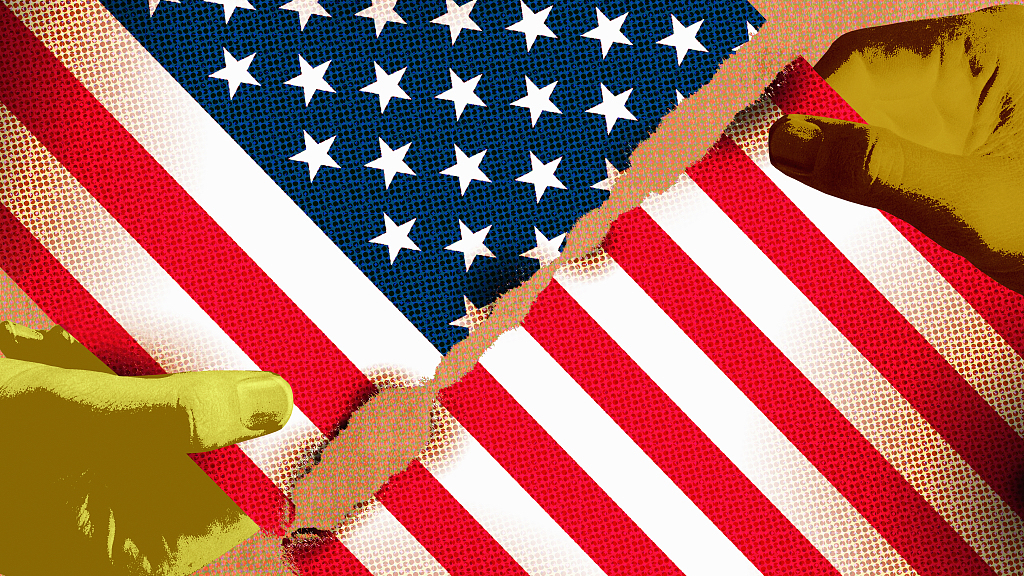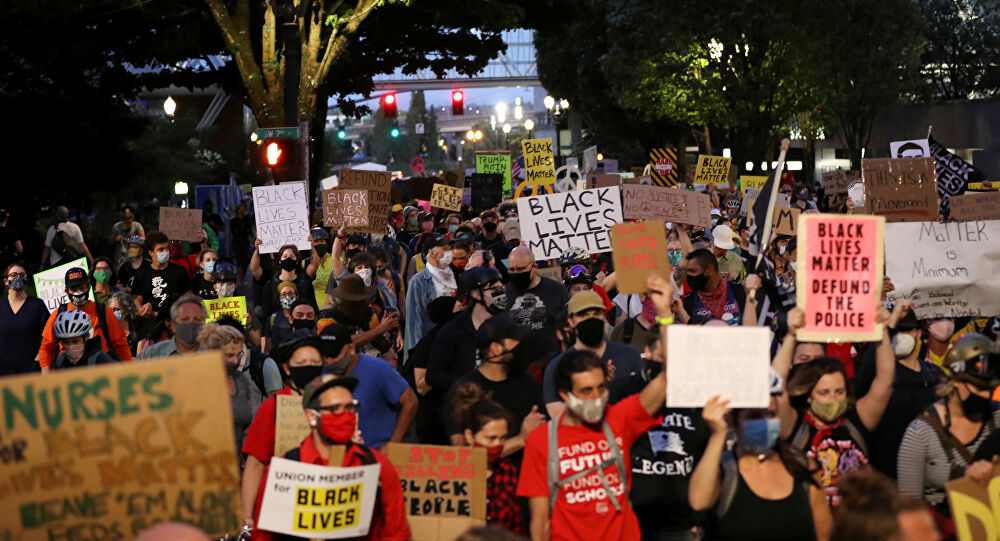
Editor's note: Zhao Minghao is a senior research fellow at Charhar Institute and an adjunct fellow at Chongyang Institute for Financial Studies, Renmin University of China. The views expressed in this article are the author's own and are not necessarily that of CGTN.
As Republicans and Democrats feud over the coronavirus relief bill, it is another sign that the cracks within the United States have deepened. With the election approaching, both parties are grasping at any opportunity to get ahead, even as COVID-19 and unemployment push tens of millions of Americans to the brink of despair.
Washington D.C. has become Washington "Dysfunctional Capital," said Harvard professor Graham Allison. In the past decades, America would usually unite during a crisis, like after the 9/11 terror attacks in 2001, and deal with it like a global leader.
Today, however, the country is fractured from the inside amid a raging pandemic. The cracks are not only between the Republicans and the Democrats, but also within each party. What's more concerning, as former Secretary of Defense James Mattis has pointed out, is that the White House stands to gain politically from tearing the nation further apart.
The American public is clearly growing fed up with the Trump administration. According to the Harvard CAPS-Harris poll in July, around 67 percent of Americans think the country is on the wrong track. In fact, no more than 25 percent of Americans trust their government since 2008, regardless of which party is in charge. Data from Pew Research shows that in 2019, only 17 percent of Americans believed the federal government would do the right thing.
But plummeting public confidence is not the only sign of a waning democracy, which is at the roots of many of the country's crises. The Economic Intelligence Unit has downgraded the U.S. from a "full democracy" to a "flawed democracy." Washington-based watchdog Freedom House has warned that American democracy is in decline, and Trump's leadership is accelerating the trend.
The COVID-19 pandemic and George Floyd protests have laid bare the fault lines in the American society. The angry crowds in the streets of American cities are not only demanding an end to "systematic racism," but also more economic opportunities to pull themselves out of poverty.

People protest against racial injustice in Portland, Oregon, U.S. /Reuters
People protest against racial injustice in Portland, Oregon, U.S. /Reuters
Despite Trump and senior U.S. officials' denial of "systematic racism," 76 percent of Americans think racism is a serious problem in the country. There are 44 million African Americans who have always been at a disadvantage when it comes to economic opportunities, medical care and education in the U.S.
The median income of an African American family is 18,000 U.S. dollars, a tenth of that of a white family, and that hasn't changed since 1990. Currently, 11.5 percent of African American adults are without medical insurances and 10.8 percent of African American families do not have internet connection.
Black people also have been disproportionately affected by the pandemic. In Michigan, the coronavirus has infected 40 percent of the African Americans, who make up 14 percent of the state's population.
Besides race, wealth inequality is another major issue. Money talks louder and louder in U.S. politics, undermining the interests of ordinary Americans and legitimizing corruption of the government. While big corporations and the wealthy enjoy tax cuts, the common people in America are getting poorer.
In 2018, the United Nations Special Rapporteur Philip Alston investigated poverty in the U.S. His team found that among all developed countries, the U.S. is the most unequal society, with tens of millions of people living in poverty, and Trump's economic policies are to blame. The report was rejected by then U.S. Ambassador to UN Nikki Haley as misleading.
Nevertheless, the struggles of ordinary Americans are on full display during pandemic, with 30 million people medically uninsured. Rising employment rates mean that more Americans will lose medical insurance. After the 2008 financial crisis, companies tried to skirt around employment contracts to reduce labor costs, creating a massive new working class which economist Guy Standing has termed "the Precariat."
This has contributed to more instabilities in U.S. household income. The Federal Reserve discovered that four in 10 Americans don't have 400 dollars in the bank to cover emergency expenses. A report by Martha Ross at the Brookings Institute puts 53 million Americans in the "low-income" category with a median wage of 10.22 dollars per hour.
The poor in America are struggling to feed themselves. During COVID-19, nearly 40 percent children from African American and Latino families are starving, according to researchers at Northwestern University. Meanwhile in New York, 750,000 out of the one million students at the city's 1,700 public schools are living under the poverty line, and one in 10 is without stable residence. The school closures during COVID-19 mean that many poor children won't be getting their free lunch at school.
As the coronavirus spreads to rural areas, the divides between urban and rural America are brought to the surface. Over the last 10 years or so, factory closures and job losses have hit America's heartland hard, while medical professionals are also leaving. A total of 128 rural hospitals, mainly in the south and the Midwest, have closed down since 2010. Another 430 were almost out of service in 2019. On top of this, the trade war Trump started has only made things worse for American farmers.
Yale political scientist Professor Jacob Hacker argued that American society and political system are under attack from worsening inequalities. Polarization and populism in politics have resulted in the inability of Americans to co-exist with those with a different party affiliation, while politicians of both parties are increasingly unwilling to compromise.
In recent years, there have been many abnormal incidents in U.S. democracy, including suppressing of minority votes and regional election frauds. Colombia law professor Bernard Harcourt also mentioned that the U.S. police force has become militarized, since Trump would threaten military crackdown on protesters as he pleases. This shows the U.S. army's counter insurgency methods during the wars in Iraq and Afghanistan are now being employed in its domestic affairs.
In a word, the U.S. is facing severe challenges domestically, while its democratic system is being tested. All this only makes the "new Cold War" led by hawks like Mike Pompeo against China seem incredibly absurd, and their ideological arrogance full of irony. Instead of looking for scapegoats and inventing "enemies," U.S. politicians have enough problems to direct their efforts toward in their own country.